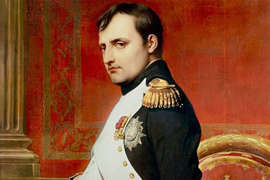
Alain Delon, as you know, did not drink cologne. But his compatriot Napoleon Bonaparte was crazy about perfume. Every day he used 2-3 bottles of cologne, says biomedicine professor Parvez Haris from De Montfort University in Leicester (UK). The servants rubbed the emperor's body with cologne, and Napoleon liked to perfume his hair with it. In addition, Bonaparte inhaled cologne vapors and even drank it for medicinal purposes.
“The commercial sale of colognes began in 1792,” says Professor Haris. – At that time, only very influential and rich people could afford this expensive perfume. Napoleon was one of these people and became one of the main promoters of cologne.
In 1793, Napoleon was promoted to brigadier general for a brilliant military operation to capture Toulon. The future emperor was then only 24 years old. During the Toulon campaign, he also contracted scabies, a disease that plagued him for the remaining years. It is accompanied by a rash, pustular formations and other dermatological “delights”. Bonaparte did not like doctors and preferred to be treated with cologne. Perhaps the abundant rubbing in of perfume made his life easier.
Only Napoleon's personal perfumer Gervais Chardin supplied his overlord with at least 50 bottles of cologne a month. And in one quarterly report of 1806, the exact number was indicated – 162 bottles in the amount of 423 francs. It is curious that while exuding persistent aromas, Napoleon himself appreciated other scents. The legend is widely known that, returning from military campaigns, he sent a messenger to Josephine with a note “Don't wash, I'll come in 3 days.”
However, that was not the point. Napoleon died on May 5, 1821 in exile on Saint Helena at a fairly flourishing age – he was only 51 years old. Therefore, it is not surprising that the circumstances of his death were explained by a wide variety of conspiracy theories. Some historians claimed that the wallpaper that was pasted over his bedroom was impregnated with a poisonous arsenate of copper. The hypothesis became widespread that Napoleon was poisoned with arsenic. Indeed, his hair samples were found to have elevated levels of arsenic.
– With a detailed study, scientists abandoned this version, – says Professor Haris. – In the era of Napoleon, many people had high levels of arsenic in their bodies, since arsenic was contained in the medicines and cosmetics of that time. I have no doubt that the main poison that killed Bonaparte was cologne. Although the combined effects of other chemicals, including arsenic, contributed to the deterioration of Bonaparte's health and, ultimately, hastened his death from stomach cancer.
Is it possible to poison yourself with cologne, you ask? It turns out you can. A number of studies have shown that an overdose of essential oils (and they are used in the formulation of colognes) can cause serious endocrine disruption. Moreover, these violations can manifest themselves in the external appearance of a person. Such symptoms could be observed in Napoleon: among them gynecomastia – an increase in the mammary glands in men, the absence of vegetation on the body. In addition, Napoleon had convulsions and was constantly experiencing a feeling of cold.
Long-term exposure to excessively high concentrations of essential oil could lead to the development of stomach cancer. Probably the toxic effect of essential oils brought the end of the conqueror closer. However, his political death came even earlier, after the lost Russian campaign.

